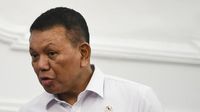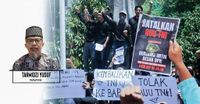As Indonesia navigates its complex political landscape, the proposed revision of the UU TNI (Law on the Indonesian National Armed Forces) has ignited fervent discussions and public demonstrations. Critics fear these changes could usher in a new era of military supremacy, reminiscent of the authoritarian control seen during the New Order era.
Concerns over the bill's implications are palpable, with significant protests erupting across the country. Demonstrators voice apprehension that the revisions would tilt power back to the military, undermining civilian supremacy. The situation raises a question on many lips: Is Indonesia on the brink of reverting to military dominance?
In a recent interview, Deputy Minister of State Secretary Marshal Madya (Ret.) Bambang Eko Suhariyanto addressed the criticisms surrounding the draft bill. He firmly denied claims that the revisions would restore the dual function of the military, a feature that facilitated military personnel's involvement in civilian roles in past regimes. "We are not returning to that system," he asserted. His arguments seek to clarify Minister Prabowo's views regarding the reform, emphasizing that significant changes were made to improve the existing draft. The government aims to overhaul more than half of the provisions set forth in the old law while assuring that military personnel's civilian roles would not resume uninterrupted as before.
Yet the fears persist among citizens and activists alike. The ongoing discourse hinges on the potential ramifications of expanded military roles in civil governance. Much of the criticism stems from the perception that the system could favor military appointments across key civilian positions, echoing opaque practices from the past.
Furthermore, public discontent is compounded by the specter of allegations against former President Jokowi, with many believing he may be influencing public sentiment against the revision for self-preservation. Observers speculate that he aims to undermine President Prabowo, fearing that the latter's consolidation of military power could pose a threat.
This fear extends to Jokowi himself, with accusations of corruption, fake diplomas, and human rights violations surfacing. Many have noted that he may be drawing tactical parallels with Philippine history, where former President Rodrigo Duterte effectively arrested his political opponents. Observing similar patterns in Indonesia raises stark considerations about the country's democratic fabric and the depth of its governance.
The article also uncovers the curious relationship between the police and military within the political sphere. The author expresses concern that police roles have increasingly permeated civilian positions— a trend that signals a troubling intertwining of law enforcement with civil governance. With police personnel occupying significant civil office roles, namely in the anti-corruption agency (KPK) and other strategic pilant positions, the lines has been blurred between civil governance and military influence.
As Indonesia stands at the crossroads, public sentiment ultimately reflects a call for transparency and accountability, demanding robust checks against the power amassed by military officers and police alike. Activists are adamant that if the draft of the UU TNI passes, it could lead to further entrenchment of military influence. This public discourse is crucial as citizens grapple with a legacy of authoritarian governance, seeking to ensure that Indonesia does not slide back into a military-led regime.
In sum, the revision of the UU TNI, along with ongoing protests, serves to highlight a broader struggle for democratic accountability. As civil society mobilizes, the voices championing civilian supremacy echo the foundational sentiment— the need for governance built on democratic ideals rather than past military dictates.
The political theatre surrounding the revision reveals a larger narrative of struggle between different power factions within Indonesia. The implications extend beyond the immediate political landscape, touching lives of ordinary citizens and shaping the nation's future. As the debates continue, so do concerns over potential outcomes. Will Indonesia be able to forge an independent path that resists the lure of military authority, or is the nation poised to enter a dark era of political repetition?


